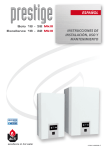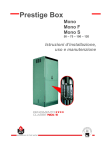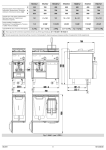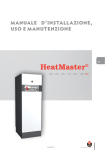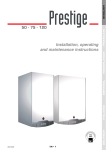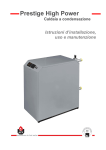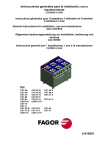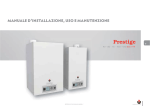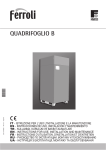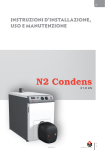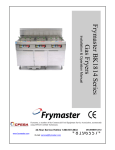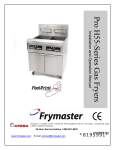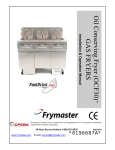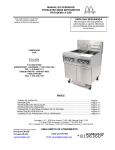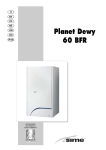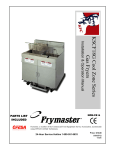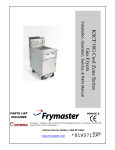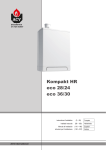Download Prestige 18-32 MkIII : Installation and service manual English
Transcript
prestige Solo 18 - 32 MkIII Excellence 18 - 32 MkIII excellence in hot water English Installation, operating and servicing instructions 03/2011 - 664Y4200 • H EN Index FR Important notes 4 Who should read these instructions 4 Symbols 4 Recommendations 4 Certification 4 Important notes 4 NL Introduction 5 Technical Characteristics 5 Frost protection 5 User guide 8 Use of the ESYS controller 8 IT ES Technical characteristics 9 General characteristics 9 Domestic hot water provision 10 Gas categories 10 Pump performances 11 Boiler pressure drop graph 11 Electrical connection 12 Schematic diagram 12 DE Heating water recommendations 13 Generality 13 Principle of prevention 13 Installation cleaning 13 14 Prestige Solo 18 - 32 dimensions 14 Prestige Excellence 18 - 32 dimensions 14 Boiler Room 15 Wall mounting 15 Easy kit Prestige Solo 18 - 32 MkIII 16 Easy kit Prestige Excellence 18 - 32 MkIII 16 RU PL Installation instructions 664Y4200 • H EN • 2 EN Index Prestige Solo DHW connection + Smart cylinder 19 Prestige Excellence DHW connection 20 Central heating connection 21 Gas connection 21 Installation of a single heating circuit with regulation by ACV 22 room thermostat. 22 Installing a single heating circuit regulated by the Room Unit 24 Installation of high and low temperature heating circuits of 14 kW maximum power with regulation by room-Unit + ZMC-2 of 230 Volts 26 Propane conversion 28 Commissioning and Maintenance 30 Commissioning of the installation 30 Boiler maintenance 30 Resistance of the temperature sensors 30 Front panel removal 31 Disassembling and inspecting the electrode 31 Dismantling the burner 32 Burner thread torque chart 32 Accessory removal 33 Dismantling the exchanger 33 Cleaning the exchanger 33 Code mode 34 Communication mode 35 Parameter mode 36 Test Mode 38 Error Mode 39 Info mode 40 ESYS errors and blocking codes 42 42 RU List of error codes + solutions DE 34 PL ESYS parameters for the specialist NL 17 ES Flue connection FR 17 IT Installation EN • 3 664Y4200 • H FR EN Important notes Who should read these instructions These instructions should be read by: - the specifying engineer - the user - the installer - the service engineer Symbols The following symbols are used in this manual: Essential instructions for the correct operation of the correct installation. • Before carrying out any work on the boiler, it is important to isolate the electrical supply. • The user must not attempt to gain access to the components inside the boiler or the control panel. Certification The apparatus bears the “CE” trademark in accordance with regulations in force in the different countries [92/42/EEC European “Output” Directive and the 2009/142/CE “Gas apparatus” Directive]. This appliance also bears the “HR-TOP” Belgian quality label [gas condensing boiler]. NL Essential instructions for the safety of people and the environment. Important notes ES Electrocution hazard: use a qualified technician. Burn hazard. If you smell gas: - Isolate the gas supply immediately. - Ventilate the room (Open the windows). - Do not use electrical appliances and do not operate switches. - Notify your gas supplier and/or your installer immediately. This manual forms part of the items delivered with the appliance and must be given to the user to keep in a safe place! The system must be installed, commissioned, serviced and repaired by an approved installer, in accordance with current standards in force. IT Recommendations The manufacturer declines all liability for any damage caused as a result of incorrect installation or in the event of the use of appliances or accessories that are not specified by the manufacturer. • Please read this manual carefully before installing and commissioning the boiler. The manufacturer reserves the right to change the technical characteristics and features of its products without prior notice. • It is prohibited to modify the interior of the appliance in any way, without the manufacturer's prior written agreement. DE • The boiler must be installed by a qualified engineer, in accordance with applicable local standards and local codes in force. The availability of certain models as well as their accessories may vary according to markets. • Failure to follow the instructions describing test operations and procedures could result in personal injury or a risk of environmental pollution. • In order to ensure the appliance operates safely and correctly, it is important to have it serviced by an approved engineer. PL • If there is a problem please contact your installer for advice. • In spite of the strict quality standards that ACV applies to its appliances during production, inspection and transport, faults may occur. Please immediately notify your approved contractor of any faults. Remember to indicate the fault code as it appears on the screen. • Defective parts can only be replaced with original factory parts. RU • Specific regulation in Belgium. The CO2 , gas flow, air flow and air/ gas supply parameters are factory preset and cannot be changed in Belgium 664Y4200 • H EN • 4 Jacket The boiler is enclosed in a steel jacket, which has been treated with a degreasing and phosphating process, before being stove enamelled at 220 °C. The inside of this jacket is lined with a layer of thermal and acoustic insulation, which minimizes losses. Heat exchanger The core of the Prestige is a stainless steel heat exchanger which is a result of exhaustive research and intensive laboratory tests. This reflects almost 90 years of experience in the use of stainless steel for heating and hot water generation systems. The specific geometry of the exchanger has been calculated in order to obtain a very large Reynolds number through all of its routes. The Prestige thus achieves an exceptional output remaining stable throughout the boiler’s lifespan, given that it does not produce any oxidation on the exchanger, which is manufactured entirely of quality stainless steel. Burner ACV uses its BG 2000-M burner for the Prestige: this is a modulating air/gas premix burner providing safe and quiet operation while limiting pollutant emissions (NOx and CO) to an incredibly low level. Although the ACV BG 2000-M burner is very modern, it uses proven technology and is manufactured using standard spare parts that are easily available on the market. Domestic hot water preparation It is specially designed to operate only as a heating boiler or in combination with the whole range of ACV water tanks. The Smart Line range is the number one choice for domestic or commercial applications. This Prestige MkIII enables you to choose between two sanitary function methods. • Full priority mode: (factory preset) the boiler cuts the heating circuit each time the domestic circuit requires it. NL Connection type C63 (x) is prohibited in Belgium. • Parallel mode: (only with a radiator heating circuit) the boiler functions for heating and domestic hot water at the same time. FROST PROTECTION The boiler is equipped with integrated frost protection: as soon as the outlet temperature [NTC1 probe] goes below 7 °C, the circulator becomes active. As soon as the outlet temperature is lower than 3 °C, the burner starts up until the outlet temperature exceeds 10 °C and the circulator continues to run for approximately 10 minutes. If an outdoor temperature probe is connected, the circulator is activated when the outside temperature drops below the preset threshold. RU PL DE In order to enable the Prestige boiler to protect the whole system against freezing, all the valves of the radiators and the convectors should be completely open. IT ES The Prestige is a wall-hung condensing boiler meeting the requirements of “HR-Top” standards in force in Belgium. The boiler is certified in compliance with “EC” standards as a room sealed appliance: C13(x) - C33(x) - C33s C43(x) - C53(x) - C63(x) - C83(x) - C93, but it can also be connected as an open appliance in category B23 or as a B23P category appliance operating at positive pressure from the B23P category. The Prestige Mklll is fitted with a regulator controlled by an “ESYS” microprocessor, which handles the safety functions (ignition, flame monitoring, temperature limitation, etc,…) and the boiler’s temperature control. The ESYS also features a weather dependent regulator. Simply connect the outdoor temperature sensor, available as an option. However, this regulator can also operate with a standard (on/off) room thermostat. The temperature of the system is then dependent on the outside conditions with compensation for the indoor temperature. Two rotating buttons placed on the control panel are accessible to the user, enabling adjustment of the temperature of the heating and domestic hot water. By entering a specific maintenance code into the unit, qualified installers may access certain parameters, in order to adapt the boiler to specific requirements. In principle, these are factory preset for all normal applications. FR Temperature control Technical Characteristics EN Introduction EN • 5 664Y4200 • H EN Introduction Prestige Solo 18 - 32 1. Concentric chimney connection Ø 60/100 mm with sampling point 1 FR 2. Automatic air vent valve 3. Burner assembly, burner tube, lighting electrode and flame viewing port 2 6 4. Stainless steel heat exchanger 5. Air inlet tube 3 6. Exhaust tube NL 7. Fan, gas valve and venturi assembly. 7 4 8. Control panel 9. Removable front cover 10. Condensate collector 11. Hydro-Block outlet with Stepper Motor 5 ES 12. Condensate trap 13. 12 litre heating circuit expansion tank 8 14. Acoustic insulation 15. Circulator with integrated automatic air vent 16. Hydro-Block return with safety valve, pressure sensor and NTC probe IT 9 DE 13 14 11 15 12 16 RU PL 10 664Y4200 • H EN • 6 EN Introduction Prestige Excellence 18 - 32 1. Concentric chimney connection Ø 60/100 mm with sampling point 1 9 2. Automatic air vent valve 4. Stainless steel heat exchanger FR 3. Burner unit 2 5. Exhaust tube 6. Condensate collector 3 7. Condensate trap 4 NL 8. Acoustic insulation 10 9. Air inlet tube 10. 12 litre heating circuit expansion tank 11. Control panel 5 12. Hot water cylinder insulation 6 ES 13. 54 litre stainless steel tank for domestic hot water: 14. Stainless steel drywell for domestic sensor: 15. Steel primary cylinder 7 11 16. Hydro-Block return with safety valve, pressure sensor and NTC probe 17. Hydro-Block flow with Stepper Motor 8 18. Manual bleed valve 18 IT 19. PVCC DHW sparge tube 20. Expansion tank support 21. A circulator with integrated automatic air vent 13 19 DE 12 20 PL 14 15 17 21 EN • 7 664Y4200 • H RU 16 EN User guide Use of ESYS regulator LCD Display The LCD display illustrated opposite enables visualisation of all of the boiler’s functions. 1 7 Heating system 2 The hydraulic circuit pressure is permanently monitored by a pressure sensor. If the pressure is less than 0.8 bar the display will show “LOP” (Low Pressure) to indicate to you that filling of the hydraulic circuit is necessary. 3 6 For more information, please ask your installer when the system is delivered. 4 5 The heating system must be kept pressurised [see “commissioning” chapter – how to determine the operating pressure]. NL FR Display structure The illustration opposite represents all symbols and information that the display can show during its function. 1. Numerical field displaying the temperatures In the case of repeated fills, contact your installer. 2. Temperature symbol 3. Symbol to select heating mode 4. Symbol indicating that the burner is operating 5. Symbol indicating that the circulator is operating 6. Symbol to select domestic hot water mode ES 7. Bar symbol ON/OFF switch Fault: The temperature setting of the appliance and the safety functions of the boiler’s various parts are constantly monitored by the “ESYS” system. If a fault occurs, the ESYS turns the unit off and displays an error code: the screen flashes and the first character is an “E” followed by the fault code.[see list of faults] IT To reset the unit: -Execute the “RESET” function by turning the domestic setting button to the left up to minimum, then continue to turn the button lightly and repeatedly for 3 seconds. - If the fault code appears again, contact your installer. PL DE Setting the temperatures A B A. Setting the heating temperature and summer/winter function: Range adjustable from 20 °C to 90 °C: When the thermostat is positioned on , the heating circuit is deactivated and the boiler is then in summer mode. RU B. Adjustment of domestic hot water temperature and RESET function: Setting range is from 20 °C to 80 °C: To operate the “RESET” function, turn the domestic hot water adjustment button to the left up to minimum, then continue to turn the button lightly and repeatedly for 3 seconds. 664Y4200 • H EN • 8 EN Technical char acteristics General characteristics Natural Gas 18 Central heating 32 Prestige Excellence Propane 18 Natural Gas 32 18 32 Propane 18 32 Max heat flow [Input] - PCI (low calorific value) kW 18,0 31,0 18,0 31,0 18,0 31,0 18,0 31,0 Max heat flow [Input] - PCS (high calorific value) KW 19,9 34,4 19,5 34,8 19,9 34,4 19,5 34,8 Min. heat flow [Input] kW 2,2 3,8 3 5,2 2,2 3,8 3 5,2 Max. useful power 80/60 °C kW 17,5 30 17,5 30 17,5 30 17,5 30 Min. useful power 80/60 °C kW 2,1 3,7 2,9 5,1 2,1 3,7 2,9 5,1 Max. useful power 50/30 °C kW 19,1 32,6 19,1 32,6 19,1 32,6 19,1 32,6 % 97 96,8 97 96,8 97 96,8 97 96,8 Efficiency at 100% load 50/30 °C % 106,1 105 106,1 105 106,1 105 106,1 105 Efficiency at 30% load [EN677] % 108 107,3 108 107,3 108 107,3 108 107,3 Flue gases CO emissions [max power] mg/kWh 10 65 3 109 10 65 3 109 NOx emissions [EN483] mg/kWh 39,9 39,9 51 68 39,9 39,9 51 68 5 5 5 5 5 5 5 5 NOx class [EN483] Flue gas temperature - Max output power 80/60 °C Mass flow rate of combustion products °C kg/h 62 83 62 83 62 83 62 83 29,56 51,76 29,05 50,89 29,56 51,76 29,05 50,89 Maximum pressure loss for the flue Pa 130 130 130 130 130 130 130 130 Maximum length of concentric flue pipe Ø 60/100 mm m 25 12 25 12 25 12 25 12 Gas flow rate G20 - 20 mbar m3/h 1,9 3,28 1,9 3,28 Gas flow rate G25 - 25 mbar 3 2,21 3,81 2,21 3,81 0,74 1,27 ES NL Efficiency at 100% load 80/60 °C FR Prestige Solo Gas flow rate G31 - 37 mbar m /h m3/h g/sec. 0,74 1,27 0,39 0,67 0,39 0,67 CO2 [max output power] (with front panel closed) % CO2 8,9 8,9 10,5 10,5 8,9 8,9 10,5 10,5 CO2 [max output power] (with front panel open) % CO2 8,7 8,7 10,3 10,3 8,7 8,7 10,3 10,3 CO2 [min output power] (with front panel closed) % CO2 8,6 8,6 10,2 10,2 8,6 8,6 10,2 10,2 Ø 3/4" 3/4" 3/4" 3/4" 3/4" 3/4" 3/4" 3/4" °C 90 90 90 90 90 90 90 90 L 8 8 8 8 16 16 16 16 54 54 54 54 bar 3 3 3 3 3 3 3 3 mbar 85 260 85 260 85 260 85 260 Ø 3/4" 3/4" 3/4" 3/4" 3/4" 3/4" 3/4" 3/4" L/h 740 1300 740 1300 740 1300 740 1300 X4D X4D X4D X4D Gas connection (male) IT Gas Capacity of the domestic circuit Max operating pressure of the heating circuit Heat exchanger pressure drop [∆T = 20 °C] Heating connection (male) Nominal flow L PL Maximum operating temperature Heating circuit capacity Electrical connection Class Supply voltage DE Hydraulic parameters IP V/Hz 230 / 50 230 / 50 X4D X4D 230 / 50 230 / 50 230 / 50 230 / 50 X4D X4D 230 / 50 230 / 50 W 135 150 135 150 135 150 135 150 Drained weight kg 46 46 46 46 78 78 78 78 RU Maximum absorbed electrical power EN • 9 664Y4200 • H EN Technical char acteristics Domestic hot water provision Prestige Excellence FR System operating at 80 °C 18 32 Peak flow rate at 40°C [∆T = 30 °C] L/10' 175 224 Peak flow rate at 40 °C [∆T = 30 °C] L/60' 583 835 L/hour 490 745 Peak flow rate at 60 °C [∆T = 50 °C] L/10' 102 103 Peak flow rate at 60 °C [∆T = 50 °C] L/60' 348 353 L/hour 295 320 Minutes 28 25 Continuous flow rate at 40°C [∆T = 30 °C] Continuous flow rate at 60 °C [∆T = 50 °C] NL Reheat time for domestic hot water Gas categories ES I2E(S) I3P II2H3B/P II2H3P II2E3B/P II2E3P II2Er3P II2L3B/P II2L3P II2ELL3B/P II2S3B/P G20 (mbar) 20 20 20 20 20 20 20 20 20 20 G25 (mbar) 25 25 25 25 25 25 25 25 25 25 G30 (mbar) 37 30 50 37 50 30 50 30 37 50 30 37 30 50 G31 (mbar) 37 30 50 37 50 30 50 30 37 50 30 37 30 50 AT Austria BE Belgium IT CH Switzerland CY Cyprus CZ Czech Republic DE Germany DE DK Denmark EE Estonia ES Spain FR France GB Great Britain GR Greece HR Croatia HU Hungary IE Ireland IT Italy LT Lithuania PL LU Luxembourg NL Netherlands NO Norway PL Poland PT Portugal RU RO Romania SE Sweden SI Slovenia SK Slovakia TR Turkey 664Y4200 • H EN • 10 EN Technical char acteristics Pump performances 6 6 5 5 4 4 2 C C 2 B B 1 3 1 A A 0 0 200 400 600 NL 3 FR 6 meter head: Prestige 32 Pressure (mH2O) Pressure (mH2O) 4 meter head: Prestige 18 800 1000 1200 0 1400 200 0 400 800 1000 1200 1400 30 35 Flow (litres / hour) ES Flow (litres / hour) 600 IT A = Available pressure (for the heating circuit) circulator on 1 B = Available pressure (for the heating circuit) circulator on 2 C = Available pressure (for the heating circuit) circulator on 3 Boiler pressure drop graph 6 3 5 2,5 3 2 1,5 1 0 200 400 600 800 1000 1200 1400 Flow (litres / hour) 0 0 5 10 15 20 25 Domestic water quantity (litres / minute) EN • 11 664Y4200 • H RU 0,5 1 0 2 PL 4 DE Domestic hot water: Prestige excellence 18 - 32 Pressure drop (mH2O) Pressure drop (mH2O) Heating: Prestige Solo 18 - 32 Prestige Excellence 18 - 32 W W R R Bk W R 1. 230 V ~ 50 Hz feed outlet 2. On/Off switch 3. Burner feed 4.Circulator 5. Gas valve rectifier 6. Pressure sensor 7. NTC2 return sensor 8. NTC1 flow sensor 9. Connection terminal 10. Clip-in connector (option) 11. NTC5 flue-gas temperature sensor 12. Burner PWM plug 13.Stepper 14. ESYS programming sheet 15.“ESYS” 15 1 1 2 2 3 4 6 5 NTC 4 7 8 9 8 4 5 6 7 4 1 5 2 6 3 X2 10 11 12 13 14 3 1 2 3 4 5 6 2 1 1 2 5 3 4 1 2 3 4 5 5 X13 1 2 3 4 5 6 7 8 9 10 11 12 13 14 Br Bk 1 2 Gr Gr 1 2 3 Br R NTC 3 R R 1 8 R Gr W BUS A W 1 7 9 Bk BUS B Bk Bk 3 10 Bk 2 B C 13 12 D B C A D A 11 3 1 4 2 9 4 X12 1 2 3 4 Bk 1 R 2 3 4 2 14 3 6 1 2 3 4 5 6 1 4 1 2 3 4 1 7 2 3 6 4 9 2 5 3 8 10 5 X1 X15 1 2 3 4 5 6 7 8 9 10 6 1 4 1 1 2 3 4 5 6 2 3 1 2 3 1 W Y / Gr 3 2 1 Br 3 Br W Br Y 2 6 1 5 7 3 8 4 X14 1 2 3 4 5 6 7 8 1 2 1 11 NTC 5 Y 10 Y Not used Bk R 2 4 3 8 7 1 3 2 10 5 4 5 ON / OFF B 2 B F00 X11 3 Br X0 9 4 2 1 2 3 4 5 1 Br 1 2 3 4 6 1 1 2 3 4 5 6 7 8 9 10 V Safety thermostat w W W W B W G Y / Gr W B Br R W Y / Gr Gr B W Br Or Bk W B W NTC 1 B R NTC 2 V 6 Y B NL B ES Br Bk Br Br V V W IT Bk DE 12 FR 1 230 V ~ 50 Hz Y / Gr Y / Gr B.Blue Bk.Black Br.Brown Gr.Green Or.Orange R. Red Violet V. White W. Y.Yellow Y/Gr.Yellow/Green Y / Gr Y / Gr PL Y / Gr EN • 12 Y / Gr 664Y4200 • H Y / Gr RU EN ELECTRICAL CONNECTION GENERALITY Filling water contains elements susceptible to damage boilers heat exchangers in case their concentration goes out of an adequate range. The risk is growing with the size of the installation since the water content per installed kW increases. Those parameters has to be measured and water needs chemical treatment in case of values out of range. ACV recommends the additives from Fernox (www.fernox.com) and from Sentinel (www.sentinel-solutions.net). Note that these products must be used in strictly accordance with the water treatment manufacturer’s instructions. EN HEATING WATER RECOMMeNDATIONS In case at least one of those recommendations can not be warranted, the boiler must be hydraulically separated of installation using plate heat exchanger NL OXYGEN Depending of the volume of the installation, a certain amount of oxygen is introduced in the installation. During the exploitation of the installation, some oxygen can be brought in the system in case of water re-filling and/or presence of hydraulic components without oxygen barrier (PE tubes & connectors). The oxygen reacts with the steel creating corrosion and generating sludges. While the ACV Prestige heat exchanger is made of stainless steel and is by consequent not sensible to corrosion, the sludges generated in carbon steel part of the installation (radiators, …) will lay down in the hot parts including the heat exchanger. The sludges in the heat exchanger have the effect to reduce the water flow rate and to thermically insulate the active parts of the heat exchanger, what could lead to damages. Before filling an installation, it must be cleaned following the standard EN14868. Chemical cleaners can be used, ACV recommends the additives from Fernox (www.fernox.com) and from Sentinel (www.sentinel-solutions.net). Note that these products must be used in strictly accordance with the water treatment manufacturer’s instructions. FR INSTALLATION CLEANING PRINCIPLE OF PREVENTION How to prevent against oxygen ? ES - mechanical system : an air remover combined to a sludges remover installed following the constructors specifications limits efficiently the risk of oxygen in the installation; - chemical system : additives allow the oxygen to stay in solution in the water. ACV recommends the additives from Fernox (www.fernox.com) and from Sentinel (www.sentinel-solutions.net). note that these products must be used in strictly accordance with the water treatment manufacturer’s instructions. HARDNESS Depending of the volume of the installation, the hardness of water and the possible re-filling, a certain amount of lime is introduced in the installation. The lime will lay down in the hot parts, including the heat exchanger creating a reduction of the water flow rate and a thermal insulation of the active parts of the heat exchanger. That phenomena can damage the heat exchanger. IT Acceptable hardness range: mmolCa(HCO3)2 / l °DH °FH 0,5 - 1 2,5 - 5,6 5 - 10 How to prevent ? DE the filling and re-filling water must be softened if necessary to match the working range. Additives can be used to keep the calc in solution in the water, ACV recommends the additives from Fernox (www.fernox.com) and from Sentinel (www.sentinel-solutions.net). note that these products must be used in strictly accordance with the water treatment manufacturer’s instructions. The water hardness must be check regularly and recorded in a file. OTHER PARAMETERS 6,6 < pH < 8,5 Conductivity < 400 μS/cm (a 25°C) Chloride < 125 mg/l Iron < 0,5 mg/l Cu < 0,1 mg/l RU Acidity PL In addition to the oxygen and the hardness, some other parameters must be controlled in the water of heating installations. EN • 13 664Y4200 • H EN Installation instructions PRESTIGE Solo 18 - 32 dimensions 340 NL 878 965 FR 130 A Heating outlet Ø 3/4" [M] A 78 400 B C D E 68 B Primary flow to DHW Ø 3/4" [M] 133 C Primary return to DHW Ø 3/4" [M] 263 D Heating return Ø 3/4" [M] ES 328 E Gas connection Ø 3/4" [M] 445 500 250 260 PL 1000 1085 DE IT PRESTIGE Excellence 18 - 32 dimensions A F BC D E 75 117,5 229 178 A Heating outlet Ø 3/4" [M] 210 B Gas connection Ø 3/4" [M] 333 C Heating return Ø 3/4" [M] 533 630 RU 560 D Cold water inlet connection Ø 3/4" [M] E DHW outlet connection Ø 3/4" [M] F Gas connection Ø 3/4" [M] 664Y4200 • H EN • 14 EN Installation instructions Installation area FR - Make sure that all air vents are unobstructed at all times. - Do not store any flammable products in the boiler room. - Do not store any corrosive materials, paint, solvents, salts, chlorine products or any other detergent products in the vicinity of this appliance. - If you smell gas, do not operate electrical switches, close the gas valve on the meter, ventilate the rooms and contact your installer. - The area around the boiler must be clean and free from dust. In case of works (boiler area or near the external air inlet) please switch off the boiler, so as to avoid the accumulation of dust in the combustion system. Accessibility Min. 25 mm DE Min. 220 mm IT ES Min. 25 mm Min. 300 mm NL The appliance must be placed in such a way that it is always easily accessible. Furthermore, the unit must have the following minimum clearance around it. Wall mounting PL - The boiler must be mounted on a non-flammable wall. - Drill two holes with a depth of 75 mm using a 10 mm drill bit, following the spacing given below. - Fasten the wall mount using the supplied anchor screws. - Attach the boiler to the wall mount. 53,2 mm 48,4 mm 101,6 mm RU 101,6 mm 48,4 mm 53,2 mm EN • 15 664Y4200 • H Easy kit Prestige Solo 18 - 32 MkIII (10800184) Easy kit Prestige Excellence 18 - 32 MkIII (10800185) 1100 mm 875 mm RU PL DE IT ES NL FR EN Installation instructions 78 mm 664Y4200 • H 35 mm EN • 16 Flue connection Example of calculation Prestige 32 with concentric chimney duct: - The connections must comply with the NBN D51-003 standard taking into account local energy suppliers’ instructions, fire regulations and regulations relating to “pollution”. EN installation 1000 mm The resistance of this system is as follows: (2 x 10) + (2 x 9) + (3 x 9) + 35 = 100 Pa. As this value is lower than the maximum authorised resistance, this installation is therefore compliant. 2000 mm - There must be no obstructions or inlets to other appliances within a radius of 0.5 metres around the Prestige terminal. - The maximum pressure drop of the chimney is 130 Pascal. You can calculate this value using the following table: (please see sample calculation). 2000 mm IT ES -The C33s and C93 configuration enables airtight operation in a preexisting chimney. The combustion air crosses the space between the tubing and the pre-existing chimney. Make sure to clean the pre-existing chimney thoroughly prior to installation, especially if there is soot or tar residue. Make sure that there is a clearance area for the combustion air at least equivalent to the area that would have been provided by separate concentric ducts or air intake ducts. NL - The horizontal flue gas exhaust ducts must be installed with a sufficient degree of slope towards the boiler: 3° of slope = 5 mm per metre of duct. FR The diagram below consists of the following parts: 2 90° pipe bends + 2 metres of horizontal pipe + 3 metres of vertical pipe + one vertical terminal. - Owing to its built-in gas/air ratio regulator, the Prestige is, to a large extent, independent of pressure drops in the air intake and flue-gas exhaust systems. However, the maximum pressure drop of this system may not be exceeded; otherwise, the output would diminish. Nevertheless, the gas/ air ratio regulator always guarantees optimal combustion with very low emissions. Flue pressure drop chart in Pascal (1 Pascal = 0.01 mbar) Separate air inlet Ø 80 mm Separate exhaust Ø 80 mm 18 32 18 32 18 32 Straight pipe 1 m 3 9 0.5 15 0.7 2.0 90° bend 4 10 0.6 1.9 1.1 3.4 45° bend 3 7 0.4 1.3 0.8 2.3 Vertical terminal 12 35 Horizontal terminal 9 26 PL Concentric chimney duct Ø 60/100 mm DE Prestige Solo / Excellence 18 - 32 RU This table is based on ACV equipment and cannot be applied generally. EN • 17 664Y4200 • H EN installation B23P C43 B23 C43 C33 C53 IT ES NL FR Chimney connection options C13 DE C93 B23 :Connection to an exhaust duct venting the combustion products outside of the installation area, with the combustion air being drawn directly from this area. PL B23P:Connection to an exhaust system of the combustion products designed to operate with positive pressure. C13 :Connection by pipes with horizontal terminals that simultaneously take in combustion air for the burner and discharge combustion products outside through openings that are either concentric or close enough together to be subjected to similar wind conditions. C33 :Connection by pipes with vertical terminals that simultaneously take in fresh air for the burner and discharge the combustion products outside through openings that are either concentric or close enough together to be subjected to similar wind conditions. C93 :Connection with an individual system of which the exhaust duct for the combustion products is installed in an exhaust pipe that is part of the building. The appliance, the exhaust duct and the terminal units are certified as an inextricable assembly. C43 :Connection by two ducts to a collective duct system serving more than one appliance; this system of collective ducts features two ducts connected to a terminal unit that simultaneously intakes fresh combustion air and discharges the combustion products outside through openings that are either concentric or close enough together to be subjected to similar wind conditions. C53 :Connection to separate ducts for the supply of combustion air and for venting the combustion products; these ducts may end in zones with different pressure levels. RU C63 :Type C boiler which is intended for connection to a room sealed flue system which is approved and sold separately. (Prohibited in Belgium). 664Y4200 • H EN • 18 Prestige Solo + Smart cylinder DHW connection EN installation Prestige Solo Optional equipment Code 5 Description 1 Sensor NTC 12 kΩ: Monitors the external domestic hot water tank 5476G003 2 4 3 7 FR - Flush the system before connecting the DHW equipment. - It is essential that the DHW cylinder is filled and pressurised before filling the central heating circuit. 6 NL 8 Before carrying out any work on the boiler, it is important to isolate the electrical supply to the unit. 1. The NTC 12k Ω sensor must be placed in the drywell of the cylinder and connected to the boiler connection terminals 3 and 4 [see diagram below]. 4 5 6 7 8 IT W 9 10 11 12 DE 3 BUS B 2 Domestic cold water isolation valve Non-return valve Safety valve Pressure reducer DHW expansion vessel DHW temperature control valve Hot water tap Condensate recovery trap Adjustment of domestic hot water production temperature. BUS A 1 1. 2. 3. 4. 5. 6. 7. 8. ES 2. Before starting up the boiler, an “Auto Set” is necessary so that the DHW sensor is detected. To do this, turn the right button to “RESET” then start the boiler up by pressing on the ON/OFF switch. From the moment that the display shows “SET” the “RESET” button can be released. Activate the “Auto Set” function so that the boiler detects the sensor or the thermostat. PL It is possible to use the domestic hot water cylinder thermostat, in place of the NTC 12kΩ sensor. Factory 10 0 EN • 19 Description T plus = temperature increase of primary flow during domestic hot water mode 0 = domestic hot water priority mode 1 = in parallel 664Y4200 • H RU EN installation Prestige Excellence DHW connection Adjustment of domestic hot water production temperature. The Prestige Excellence can be connected directly to the DHW circuit. Flush the system before connecting the DHW. FR The system must be equipped with an approved safety unit including a 7 bar safety valve, a non-return valve and an isolation valve. (Temperature and pressure relief valve required in the UK). When the operating pressure exceeds 6 bar a pressure reducer must be installed before the safety unit. During the heating process, the domestic water expands and the pressure increases. As soon as the pressure exceeds the safety valve setting, the valve opens and discharges. The use of a DHW expansion tank (minimum 2 litres) will avoid a discharge of water and reduce water hammer. NL Vent the cylinder by opening a hot water tap. Warning: the simultaneous evacuation of water and air may cause spluttering. The hot water can reach temperatures greater than 60°C. This can lead to risk of burns. Therefore, the installation of a temperature control valve on the hot flow immediately after the appliance is advised. Factory 10 ES 0 The use of stop taps on the DHW system can cause pressure waves on closing. To avoid this use devices to alleviate water hammer. DE IT Prestige Excellence RU PL 1 2 4 7 3 6 5 1. 2. 3. 4. 5. 6. 7. Domestic cold water isolation valve Non-return valve Safety valve Pressure reducer DHW expansion vessel DHW temperature control valve Hot water tap 664Y4200 • H EN • 20 Description T plus = temperature increase of primary flow during domestic hot water mode 0 = domestic hot water priority mode 1 = in parallel Central heating connections - Fill the system with fresh tap water. Contact your ACV representative or installer about the use of inhibitors. - It is possible that the connections are capped due to the presence of residual water from tests carried out on the appliance. Please ensure that all the caps are removed before filling the appliance. - The sluice gate connections for filling and/or draining of the appliance are found on the bottom. - Fill the appliance to a minimum pressure of 1.0 Bar. - Vent the complete system and refill the system to 1.5 Bar. - The heating circuit must be designed so as to ensure a continuous flow around the boiler; if this flow can be interrupted when all the thermostatic valves are closed then a bypass is required to assure a minimum flow of 200 l/h. - Ensure that the condensate trap is fitted and connect the hose to the drain using a connection that can be inspected. If necessary fill the trap with clean water. Take the necessary precautions to prevent any risk of the condensate freezing. ES NL Recommendations - The whole central heating system must be thoroughly flushed with clean water before being connected to the appliance. - Mount the boiler using the supplied bracket ensuring that it is level or alternatively use the assembly panel available as an option for the Prestige Solo model. - If the boiler is mounted on a wall of lightweight construction it is advisable to use rubber dampers to reduce the transmission and amplification of noise. - The optional mounting plate for the Prestige Solo is equipped with fittings to provide rapid assembly and connection to the central heating and DHW systems. If you do not use the assembly panel, the connections can be carried out using standard straight adaptors. - The central heating safety valve is integrated and located under the appliance. It must be connected to the drain with an air gap (allowing an inspection). - The central heating pump is incorporated into the appliance and, via the three position switch; its speed can be adapted according to the system requirements. -The Prestige Solo is equipped with a 12 litre integrated expansion tank. Depending on country and associated standards, the Prestige Excellence is equipped with a 12 litre expansion tank. This is sufficient for systems containing approximately 120 litres of water for central heating. For systems of a larger capacity, an adapted expansion tank can be added to the Prestige Solo and to the Prestige Excellence. Heating connection: overview IT Isolating valve in the heating circuit Safety valve calibrated to 3 bar, with pressure gauge Non-return valve System filling unit External expansion tank (if necessary) Drain down valve Condensate trap connection 2 7 1 It is compulsory to install a safety thermostat on the low temperature heating circuit outlet. DE 1. 2. 3. 4. 5. 6. 7. FR EN installation 3 1 4 5 PL 6 Gas connection - Vent the gas pipe and carefully check that there are no leaks on the boiler’s internal and external pipes. - The gas connections must comply with all applicable standards (in Belgium: NBN D51-003). - Check the system’s gas pressure. Please refer to the technical data chart. - If there is a risk of dirt from the gas network, place a gas filter upstream of the connection. - Check the gas pressure and consumption when commissioning the appliance. EN • 21 RU - Our Prestige® boilers are equipped with a Ø 3/4”M connection to connect a gas isolator. 664Y4200 • H EN installation Installation of a single heating circuit regulated by an ACV 22 room thermostat AF120 Schematic diagram ACV 22 FR The heating system (radiators or floor) is controlled by an On/Off room thermostat. In this configuration, the boiler constantly adapts its operation to the outdoor temperature, if an outside temperature sensor is connected. The circulator is triggered as soon as the room thermostat generates a heat demand. NL Advantages for the user: - Comfort - Maximum output - Simplicity of the system ES A B Before the boiler’s start up, an “Auto Set” is necessary so that the boiler detects the DHW sensor. To do this, turn the right button to “RESET” then start up the boiler by pressing on the ON/OFF switch. From the time that the display shows “SET” the “RESET” button can be released. A. - Heating temperature setting guidelines without external sensor - Maximum heating temperature limit with external sensor - The thermostat is positioned on , the heating circuit is deactivated and the boiler is then in summer mode.. IT B. - Domestic hot water temperature setting. (Prestige Excellence or as an option with an external domestic hot water tank). Optional equipment Description 10800018 ACV 22 Room thermostat 10510100 Outside temperature sensor, 12 kΩ — AF120 10510900 Safety thermostat RAM 5109: Compulsory to protect all floor heating circuits. 5476G003 Sensor NTC 12 kΩ: Monitors the external domestic hot water tank. RU PL DE Code 664Y4200 • H EN • 22 4 5 6 8 FR 7 9 10 11 12 NL 3 W ES It is compulsory to install a safety thermostat on the low temperature heating circuit outlet. Heating curve Description P1 = 10 90 P1 = 9 P1 = 8 P1 = 7 P1 = 6 80 10 0 T plus = temperature increase of primary flow during domestic hot water mode 0 = domestic hot water priority mode 1 = in parallel P1 = 4 60 P1 = 3 50 P1 = 2 40 P1 = 1 30 DE 20 Minimum temperature of the heating outlet P1 = 5 70 P2 = 20 10 20 15 10 5 0 -5 -10 -15 -20 -25 External temperature (°C) PL Selection of the heating curve RU 6 IT Factory Water temperature (°C) 2 BUS B 1 Only for low temperature heating circuits BUS A Only with a domestic hot water tank. EN installation EN • 23 664Y4200 • H EN installation Installing a single heating circuit with Room Unit regulation Schematic diagram AF120 Room Unit In this configuration, the boiler continuously adapts its operation to the outside temperature. NL FR A Room Unit thermostat controls the heating (radiators or floor heating). The latter enables a choice between different heating functions and authorises up to 3 daily programmes for heating and for domestic hot water. The Room Unit thermostat has the advantage of displaying information on system status. ES A B Before the boiler’s start up, an “Auto Set” is necessary so that the boiler detects the DHW sensor. To do this, turn the right button to “RESET” then start up the boiler by pressing on the ON/OFF switch. From the time that the display shows “SET” the “RESET” button can be released. A. - Heating temperature setting guidelines without external sensor - Maximum heating temperature limit with external sensor - The thermostat is positioned on , the heating circuit is deactivated and the boiler is then in summer mode.. For more information, consult the Room Unit instructions IT B. - Domestic hot water temperature setting. (Prestige Excellence or as an option with an external domestic hot water tank). When connected with a "Room Unit", the two knobs (A) and (B) have no action on the boiler, except for the "Reset" function. DE Optional equipment RU PL Code 664Y4200 • H Description 10800189 RSC Room Unit: Delivered with outdoor sensor 10510100 Outside temperature sensor, 12 kΩ — AF120 10510900 Safety thermostat RAM 5109: Compulsory to protect all floor heating circuits. 10800201 ESYS clip-in interface: Authorises communication between the boiler and the RSC Room Unit. 5476G003 Sensor NTC 12 kΩ: Monitors the external domestic hot water tank. EN • 24 Only with a domestic hot water tank. EN installation Interface address “0” Only for low temperature heating circuits =0 FR BUS B BUS A 1 W 2 2 3 4 5 6 7 8 9 10 11 12 NL 1. Clip-in connector 2. ESYS Clip-in interface 3. “ESYS” Plate ES It is compulsory to install a low temperature heating circuit outlet safety thermostat. 0 IT T plus = temperature increase of primary flow during domestic hot water mode 0 = domestic hot water priority mode 1 = in parallel DE 10 Description PL Factory RU 1 3 EN • 25 664Y4200 • H EN installation Installation of a high and low temperature heating circuits regulated by the Room Unit + ZMC-2 of 230 Volts AF120 Room Unit FR Schematic diagram This constitutes a simple way to control 2 heating circuits whose mixed circuit power is limited to 14 kW. This configuration is ideal for a basic system of floor heating with supplementary heating provided by radiators. ZMC-2 (230 Volt) ES NL The Room Unit allows for control of the two different circuits according to climatic conditions, selection among different heating functions and authorization of up to 3 weekly schedules for the heating and DHW. KVT M Before the boiler’s start up, an “Auto Set” is necessary so that the boiler detects the DHW sensor. To do this, turn the right button to “RESET” then start up the boiler by pressing on the ON/OFF switch. From the time that the display shows “SET” the “RESET” button can be released. RAM For more information, consult the Room Unit instructions Optional equipment Code 10800189 RSC Room Unit: Delivered with outdoor sensor. 10800218 Module ZMC-2 230 Volt (kit): Manages the second heating circuit - alarm contact - only functions in conjunction with the Room Unit RSC. 10510100 Outside temperature sensor, 12 kΩ — AF120 10800201 ESYS clip-in interface: Enables communication between the boiler and the Room Unit RSC. 10800226 Basic low temperature kit — BT 14: The direct circuit is fed by the boiler’s internal circulator, whereas The low temperature circuit (maximum 14 kW) is fed by the BT 14 kit. Drywell pocket for flow sensor included. 10800044 KVT 2 kΩ drywell sensor: Control of the regulated circuit. 10510900 Safety thermostat RAM 5109: Compulsory to protect all floor heating circuits. 5476G003 Sensor NTC 12 kΩ: Monitors the external domestic hot water tank. IT DE PL RU 664Y4200 • H Description EN • 26 EN installation Diagram for wiring in compliance with applicable standards. 230 Volt - 6A 50Hz ZMC-2 L 1 2 3 N N N N A B VF 0 VE 0 FR (230 Volt) KVT 2kΩ M 1 2 3 4 5 6 7 8 ES M NL Only with a domestic hot water tank. W 9 10 11 12 IT Hydraulic: P6 = 23 NC = high temperature circuit normally closed. DE It is compulsory to install a safety thermostat on the low temperature heating circuit outlet. Factory 10 Description Interface address “0” =0 T plus = temperature increase of primary flow during domestic hot water mode 0 PL 1 0 = domestic hot water priority mode 1 = in parallel 2 3 1. Clip-in connector 2. ESYS Clip-in interface 3. “ESYS” Plate EN • 27 RU L BUS B N BUS A PE 24 Volt VA 664Y4200 • H EN Installation Propane conversion As indicated on the data plate, the boiler is factory preset to operate with G20 gas, G25 gas, G30 gas or G31 gas. FR To convert the boiler to another type of gas, it is necessary to: • change the orifice • adjust the CO2 • adjust the parameters as indicated in the chart below. D The CO2 parameters to be set are indicated in the technical data table. B Changing the orifice: 1. Turn off the gas and electric power supplies. NL 2. Unscrew the gas pipe coupling (A) below the valve. E 3. Unplug the gas valve (B). F C 4. Dismantle the gas valve-venturi assembly (C). 5. Remove the gas valve from the venturi (D) and change the orifice (F). A ES Important: position the orifice seal(s) correctly (E). Cover plate 6. Reassemble the gas valve-venturi assembly, following the same procedure in reverse order. IT 7.Stick the yellow (617G0152) “Propane” self adhesive sticker on the gas valve (B). Prestige 18 Prestige 32 G20 5.2 — G25 5.2 — G30 3.4 5.2 G31 3.4 5.2 The conversion of natural gas to propane or the reverse is not authorized in certain countries such as Belgium. Refer to the gas categories chart. DE Before carrying out the CO2 setting, it is important to modify the fan speed parameters as indicated in the table below. Prestige 18 Setting with front panel closed Boiler’s maximum power PL Maximum fan speed Boiler’s minimum power Minimum fan speed % CO2 rpm % CO2 rpm Prestige 32 G20 - G25 G30 - G31 G20 - G25 8.9 10.5 8.9 G30 - G31 10.5 6000 5700 6250 6200 8.6 10.2 8.6 10 1100 1500 1100 1500 = Minimum load % 0 8 0 8 = Maximum load (central heating) % 100 94 100 100 Boiler’s maximum power % CO2 8.7 10.3 8.7 10.3 Boiler’s minimum power % CO2 8.4 10 8.4 9.8 RU Setting with front panel open 664Y4200 • H EN • 28 EN Installation RU PL DE IT ES NL FR After working on the boiler, check that the connections are gas tight during operation. [See control zones below] EN • 29 664Y4200 • H EN Commissioning and maintenance COMMISSIONING THE SYSTEM Checking the settings Filling the DHW circuit NL FR -In the event of installation with a DHW cylinder, fill the cylinder slowly and vent it by opening the hot water tap. - Vent all of the taps and check for any leaks in the domestic hot water circuit. Filling the heating circuit - Before filling the boiler’s heating circuit, switch the appliance on and wait until the display shows the “E 47” error code indicating that the boiler has insufficient water pressure, then switch the appliance off. This enables the 3-way valve to get into mid position to allow filling of the heating circuit. - Fill all of the heating circuit up to a minimum of 1.5 Bar using the filling loop for your system. The filling phase must take place slowly to allow proper venting of the system through the automatic air vent. - If your system is equipped with a hot water tank, vent the tank’s primary circuit with the help of the manual vent valve positioned on the top of the tank. - Check for any leaks in the heating circuit. - Check if the parameters are set to meet the user’s needs. - Checking the boiler’s settings: only a trained ACV installer or the ACV maintenance department can perform this task. - Set the appliance to maximum power (see ESYS instructions for installer). - Check the dynamic gas pressure on the gas valve (see diagram below, ref.1). This must be at least 18 mbars. Let the appliance heat for a few minutes to a minimum temperature of 60 °C. Check the CO2 setting of the appliance using a flue gas analyser. The optimum value is indicated in the technical characteristics chart. To increase the CO2 value, turn the venturi screw counter-clockwise. Turn it clockwise to decrease this value (see diagram below, ref. 2). Then put the appliance in minimum power mode (see ESYS instructions for the installer). Let the appliance stabilize for a few minutes. Check the CO2 value. It should be either equal to the value at full power or a maximum of 0.5 % less than it. If you observe a significant deviation, please contact ACV’s maintenance department. boiler maintenance ES Gas supply and CO2 adjustment - Open the gas isolation valve, vent the pipe and check for any possible gas leaks. - Check that the condensate trap ball is present. - Switch the boiler on using the ON/OFF switch. If the boiler does not start up, check the boiler’s heat and/or room thermostat settings, increase the temperature if necessary. - Check the gas pressure (see diagram below ref. 1) and leave the boiler to heat for a few minutes. v 3 Ref. 3: The OFFSET adjustment of the gas valve is factory preset and sealed. It cannot be modified. ACV recommends that you have your boiler inspected, and cleaned, if necessary, at least once a year. Isolate the appliance before undertaking any work on it, even if you are simply taking measurements and making adjustments. - Check that the condensate trap is not clogged, fill it as required and check for leaks. - Check that the safety valves are in good working order. - Vent the whole system and refill the appliance if needed until it reaches 1.5 Bar. In the case of repeated fills, contact your installer. IT - Check the boiler’s combustion in maximum power mode. If this value is very different from the original setting it may indicate an obstruction in the air intake ducts or flue gas exhaust pipes, or that the exchanger is clogged. - Set the boiler to high power mode and check the CO2 using the technical characteristics chart. Next, set the boiler to minimum power mode and check the CO2 using the same chart. - Set the central heating and hot water temperatures according to the values indicated in the instructions for use. - Bleed the central heating system again, and if necessary, fill to reach the desired pressure: - Make sure that the heating circuit is properly balanced, and, if necessary, adjust the valves to obtain the correct flow rate for all circuits or radiators. Resistance of the temperature sensors PL DE 1 T° [°C] RΩ T° [°C] RΩ T° [°C] RΩ - 20 98200 25 12000 70 2340 - 15 75900 30 9800 75 1940 - 10 58800 35 8050 80 1710 -5 45900 40 6650 85 1470 0 36100 45 5520 90 1260 5 28600 50 4610 95 1100 10 22800 55 3860 100 950 15 18300 60 3250 20 14700 65 2750 RU 664Y4200 • H EN • 30 Specific regulation in Belgium: The CO2, gas flow, air flow and air/gas supply parameters are factory preset and cannot be changed in Belgium. Before carrying out any work on the boiler, it is important to isolate the electrical supply from the unit. Front panel removal Disassembling and inspecting the electrode NL FR EN Commissioning and maintenance ES 1. Open the boiler’s front panel (see opposite). 2. Remove the earth lead connection. 3. Unscrew the two retaining screws. 3.Check the condition of the electrode and the seal, replace if necessary, before reassembling the electrode by following the above procedure in reverse order. 3 3 IT ➊ RU PL DE ➋ EN • 31 664Y4200 • H EN Commissioning and maintenance Dismantling the burner ➋ ➎ ➍ FR ➌ ➏ F Shut off the gas supply before dismantling the burner. ➐ NL 1. Open the boiler’s front panel. 2. Disconnect the PWM jack plug and the fan’s 230 Volt plug. 3. Disconnect the gas valve’s jack plug. 4.Disconnect the ignition and ionisation cable from the “ESYS” rear panel, see diagram below. ➑ IT ES ➒ 5. Unscrew the Ø 3/4" [F] ➊ gas coupling. 6.Unscrew the 5 nuts of the burner using a socket and ratchet; follow the order of the diagram opposite to make the disassembly easier. 7. Carefully lift up the complete burner ➐ with the gas valve-venturi taking care not to damage the insulation brick ➒ and remove it from the exchanger. 8.Check and replace the insulation brick ➒ if necessary and the seal ➑ before re-assembling the burner by following the above procedure in reverse order. ➊ Burner thread torque chart Thread torque (Nm) DE Description A = Burner flange nuts (5 nuts) Max 5 6 B = Burner tube screws (3 screws) 3 3.5 C = Fan nuts (3 nuts) 3 3.5 D = Gas valve screw (3 screws) 3.5 4 E = Venturi screws (2 screws) 3.5 4 3 3.5 F = Electrode screws (2 screws) B C A D Solo Excellence RU PL Min. E 664Y4200 • H EN • 32 EN Commissioning and maintenance Dismantling accessories Circulator FR Diverting valve motor (Stepper) NL Pressure sensor Dismantling the exchanger ES - Drain the central heating water using a connection below the lower level of the appliance. - Let the appliance drain completely. - Unscrew retaining screw “A” from the exchanger. NTC2 heating return temperature sensor - Dismantle the electric connections from the burner, as well as the NTCs. - Dismantle the inlet and outlet hydraulic couplings by removing the pins. Use caution while disassembling: residual water may escape from the exchanger. - Disassemble the condensate trap connection and disassemble the retaining screw situated between the condensate trap and the exchanger. - Lift the complete exchanger assembly vertically. The exchanger detaches from the retaining bracket and is free to remove. - Check the condition of the O-Rings and replace them if necessary. Reassemble the exchanger using the same procedure in reverse order. DE IT A RU heating safety valve PL Cleaning the exchanger - Dismantle the burner previously described. - Remove the burner insulation. - Use a vacuum cleaner to clean out the chamber. - Disconnect the chimney from the exchanger. - Check to see if the condensate collector is dirty and clean if necessary. - Check the burner’s insulation and seal. Replace if necessary. - Check the electrode and replace if necessary. - Reassemble the burner and check for any leaks. - Switch the appliance on again. Set to maximum power mode and check for leaks. - Check the gas pressure and the CO2 setting as described in the previous section. EN • 33 664Y4200 • H EN ESYS par ameters for the specialist Code mode Display FR Max 5 sec. Display NL Display Min ES Display Display IT Max Display DE Display Max PL Display Display RU Min 664Y4200 • H EN • 34 EN ESYS par ameters for the specialist Communication mode FR Display NL Display ES ½ Sec. IT Display Complete communication Display DE Return ESYS interface Clip-in communication only PL 5 Sec. RU Display No communication EN • 35 664Y4200 • H EN ESYS par ameters for the specialist Parameter mode Display FR To save the new value wait until the display stops flashing. Return NL Display ½ Sec. Display RU PL DE IT ES Display 664Y4200 • H 5 Sec. EN • 36 EN ESYS par ameters for the specialist Factory parameter Range of parameters P01 6 0 - 10 Selection of the heating curve P02 20 20 - 40 Minimum temperature of the heating outlet P03 0 0 - 100 Minimum load P04 100 0 - 100 Maximum load (central heating) P05 10 5 - 30 T plus = outlet temperature increase during function in domestic hot water mode P06 0 0 = ON 1 = Parallel FR NL DHW priority ES Description P1 = 10 90 IT Heating curve P1 = 9 P1 = 8 P1 = 6 80 P1 = 5 70 P1 = 4 60 DE Water temperature (°C) P1 = 7 P1 = 3 50 P1 = 2 40 P1 = 1 30 10 15 10 5 0 -5 -10 -15 -20 -25 External temperature (°C) RU 20 PL P2 = 20 EN • 37 664Y4200 • H EN ESYS par ameters for the specialist Test mode Manual selection of the input in CH or DHW mode from 0 to 100%. FR This mode is used to control combustion settings. NL Display Return ES Display ½ Sec. IT 5 Sec. Display DE Display Power adjustement 0 - 100 % PL CH Mode RU Display Power adjustement 0 - 100 % DHW Mode 664Y4200 • H Display EN • 38 EN ESYS par ameters for the specialist Error Mode NL FR Display Return ES Display ½ Sec. IT 5 Sec. Display RU PL DE Display EN • 39 664Y4200 • H EN ESYS par ameters for the specialist Info mode FR Display NL Return Display ½ Sec. ES 5 Sec. Display IT Display bar DE (30 /10) ≥ 2,4 µA PL rpm RU 0% = CH 100% = DHW 664Y4200 • H EN • 40 EN ESYS par ameters for the specialist Display FR Display NL Tº Heating outlet ES Tº Heating return Tº Domestic hot water IT Outside T° (°C) DE Flue T° PL Calculated flow T° RU Display EN • 41 664Y4200 • H EN “ESYS” errors and blocking codes List of error codes + solutions [in Error mode] Codes Description of the fault Solution for the fault E 01 No flame presence after five start-up attempts 1. Check the wiring (short circuit in the 24 V wiring) 2. Check the electrode and its position 3. Check the burner gas level E 02 Abnormal flame signal detected 1. Check the ignition wiring 2. Check the electrode and its position 3. Replace the ESYS (water damage) Maximum thermostat open Check the link across 9-10. Check the thermostat and wiring if fitted. T1 or T2 > 110°C 1. Check the NTC wiring and replace it if necessary. 2. If the NTC1 sensor is OK, check if there is water flow in the boiler E 05 No tachometer signal from the fan 1. Check the PWM connection 2. Check the fan’s wiring 3. If the problem persists after two “RESET” attempts, replace the fan, if not, replace the “ESYS” circuit board. E 07 Flue gas temperature too high (NTC5) 1. Check the connection of the NTC5 sensor 2. Check the wiring of the NTC5 sensor 3. If the problem persists replace the NTC5 sensor E 08 No flame detection 1. Check the electrode gap 2. Check the electrode resistance [1kΩ] E 09 Gas valve relay error If the problem persists after two “RESET” attempts, Replace the “ESYS” circuit board if necessary E 11 Crack of sensor NTC1 or NTC2 Check the sensor NTC1 and NTC2 E 13 Remote “RESET” error 1. Do a local “RESET” on the boiler. 2. If the problem persists replace the “ESYS” circuit board E 21 ADC error “RESET” the system or Replace the “ESYS” circuit board if necessary E 25 CRC Error “RESET” the system or replace the “ESYS” circuit board if necessary E 30 Short circuit NTC1 1. Check the connection of the NTC1 sensor 2. Check the wiring of the NTC1 sensor 3. If the problem persists replace the NTC1 sensor E 31 NTC1 open circuit 1. Check the connection of the NTC1 sensor 2. Check the wiring of the NTC1 sensor 3. If the problem persists replace the NTC1 sensor E 32 Short circuit NTC3 1. Check the connection of the NTC3 sensor 2. Check the wiring of the NTC3 sensor 3. If the problem persists replace the NTC3 sensor E 33 NTC3 open circuit 1. Check the connection of the NTC3 sensor 2. Check the wiring of the NTC3 sensor 3. If the problem persists replace the NTC3 sensor E 34 Deviation of the mains frequency > 1.5 Hz Check the mains frequency E 37 Water pressure Check the water pressure E 41 No communication from the water pressure sensor Check the water pressure sensor and replace if necessary E 03 RU PL DE IT ES NL FR If a fault occurs during operation, the system locks out and the screen starts to flash. The first character is an “E” and flashes, the following two characters indicate the code for this fault, see the chart below. To unlock the system: • Press “RESET” on the screen. • If the fault reoccurs, contact your installer. 664Y4200 • H EN • 42 Codes Description of the fault EN “ESYS” errors and blocking codes Solution for the fault Short circuit NTC2 1. Check the connection of the NTC2 sensor 2. Check the wiring of the NTC2 sensor 3. If the problem persists replace the NTC2 sensor E 44 NTC2 open circuit 1. Check the connection of the NTC2 sensor 2. Check the wiring of the NTC2 sensor 3. If the problem persists replace the NTC2 sensor E 45 Short circuit NTC5 1. Check the connection of the NTC5 sensor 2. Check the wiring of the NTC5 sensor 3. If the problem persists replace the NTC5 sensor E 46 NTC5 open circuit 1. Check the connection of the NTC5 sensor 2. Check the wiring of the NTC5 sensor 3. If the problem persists replace the NTC5 sensor E 47 Open or defective water pressure sensor Check the water pressure sensor and replace if necessary NTC Maximal difference T1 - T2 exceeded Check the water flow rate RU PL DE IT ES NL FR E 43 EN • 43 664Y4200 • H EN FR NL ES IT DE PL RU 664Y4200 • H EN • 44












































